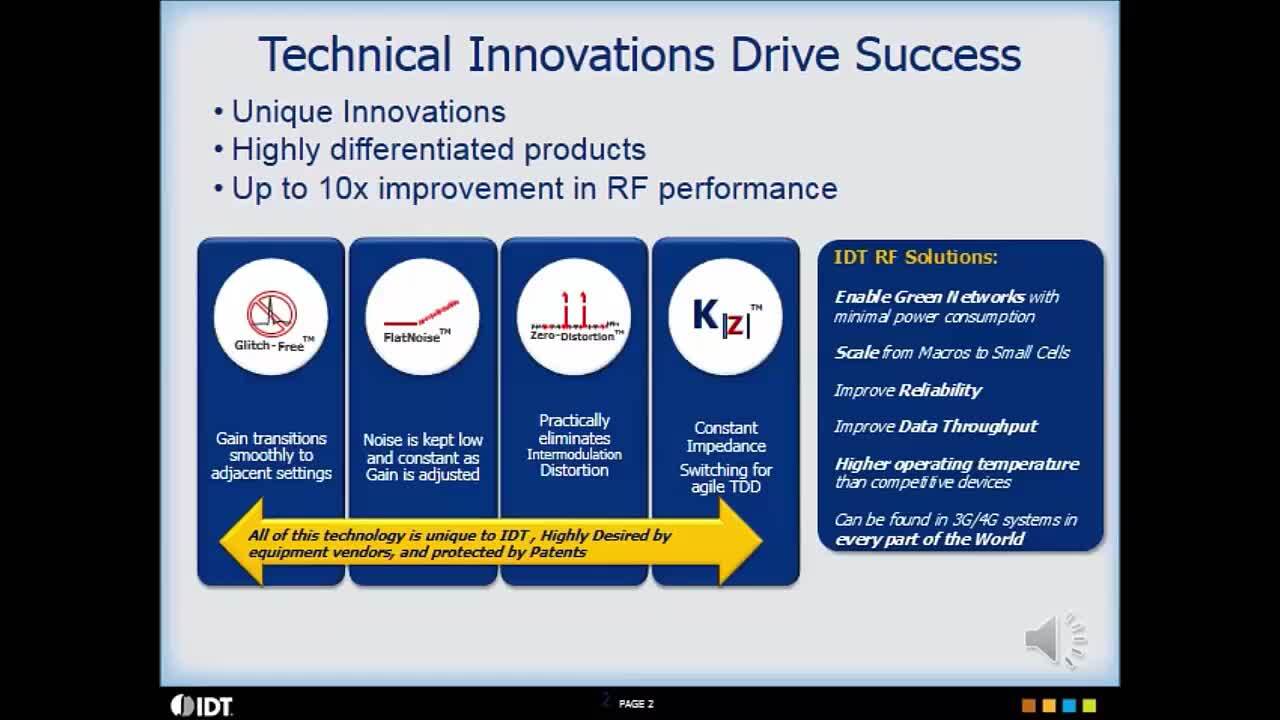Overview
Description
The F1129 family is a series of single-ended input/differential output 1400MHz to 6000MHz high gain RF amplifiers.
The F1129 series is designed to operate with a single 5V power supply using a nominal 70mA of ICC. When using a supply voltage of 5V, the F1129 variant provides 18dB typical gain with 2.2dB noise figure and +32dBm OIP3 at 3600MHz.
Features
- RF range: 1400MHz to 6000MHz
- F1129LB Variants: 1400MHz to 3200MHz
- F1129MB Variants: 3000MHz to 4200MHz
- F1129HB Variants: 4000MHz to 6000MHz
- Gain = 18dB at 3600MHz
- Noise figure = 2.2dB at 3600MHz
- OIP3 = +32dBm at 3600MHz
- Output P1dB = +18dBm at 3600MHz
- ICC = 70mA at 5V
- 2mA standby current
- 50Ω single-ended input impedances
- 100Ω differential output impedances
Comparison
Applications
- 5G/Massive MIMO Base Stations
- 4G TDD and FDD Base Stations
- 2G/3G Base Stations
- Repeaters and DAS
- Point-to-Point Infrastructure
- Public Safety Infrastructure
- Military Handhelds
Documentation
|
|
|
|
|---|---|---|
| Type | Title | Date |
| Datasheet | PDF 1014 KB | |
| Datasheet | PDF 987 KB | |
| Guide | PDF 2.24 MB | |
| Product Brief | PDF 983 KB | |
4 items
|
||
Design & Development
Models
ECAD Models
Schematic symbols, PCB footprints, and 3D CAD models from SamacSys can be found by clicking on products in the Product Options table. If a symbol or model isn't available, it can be requested directly from the website.

Product Options
Applied Filters:
Videos & Training
This video highlights the customer benefits of IDT's (acquired by Renesas) innovative RF products, which offer up to 10x improvement in RF performance. Key technologies include glitch-free technology for smooth transitions, flat-noise technology for consistent noise performance, zero-distortion technology for minimal intermodulation distortion, and more.
Transcript
Hello, my name is Dan Terlep. I'm a Product Definer in IDT's RF group. What I'm going to talk about are some of the customer benefits of IDT's technical innovations used in RF products. These are unique innovations that differentiate our products from competitive parts. Up to 10x improvement in RF performance can be obtained when using these devices in your designs. This technology is highly desired by equipment vendors and is protected by patents.
Glitch-free technology essentially eliminates the transient overshoot that can occur during mSv attenuation state transitions of standard digital step attenuators. Flat-noise technology maintains near constant noise performance [inaudible 00:00:48] reduced in our variable gain amplifiers, thus optimizing system level signal-to-noise performance. Zero-distortion technology practically eliminates intermodulation distortion in our RF mixers and amplifiers, enhancing the system's quality of service. Kz refers to constant impedance technology, which has implemented a new line of RF switches that allows 'hot switching' in TDD systems.
Additional benefits of using IDT's RF solutions include: enable screen networks with minimal power consumption; allow scaling from macrocells to microcells using the same device with reduced voltage, reduced current, or both; improves reliability by replacing gallium arsenite with silicon; improves data throughput by optimizing signal-to-noise performance and overall dynamic range; tolerates higher operating temperature than competitive devices.
Note that IDT's RF cards are used by all major cellular 3G and 4G equipment manufacturers for systems deployed all over the world. IDT's advanced RF portfolio using these technologies includes: mixers, digital step attenuators, RF switches, variable gain amplifiers, and modulators. These are silicon monolithic devices offered in QFN packages.
In summary, IDT's RF portfolio replaces gallium arsenite parts, results in higher reliability, provides better signal-to-noise performance, faster settling times, eliminates glitching and third-order intermodulation distortion, reduces DC power consumption, and operates at higher temperatures. Thank you for your time, and please make sure to visit IDT's RF website for a more complete look at our product portfolio. For additional information and support, please use the email shown.






